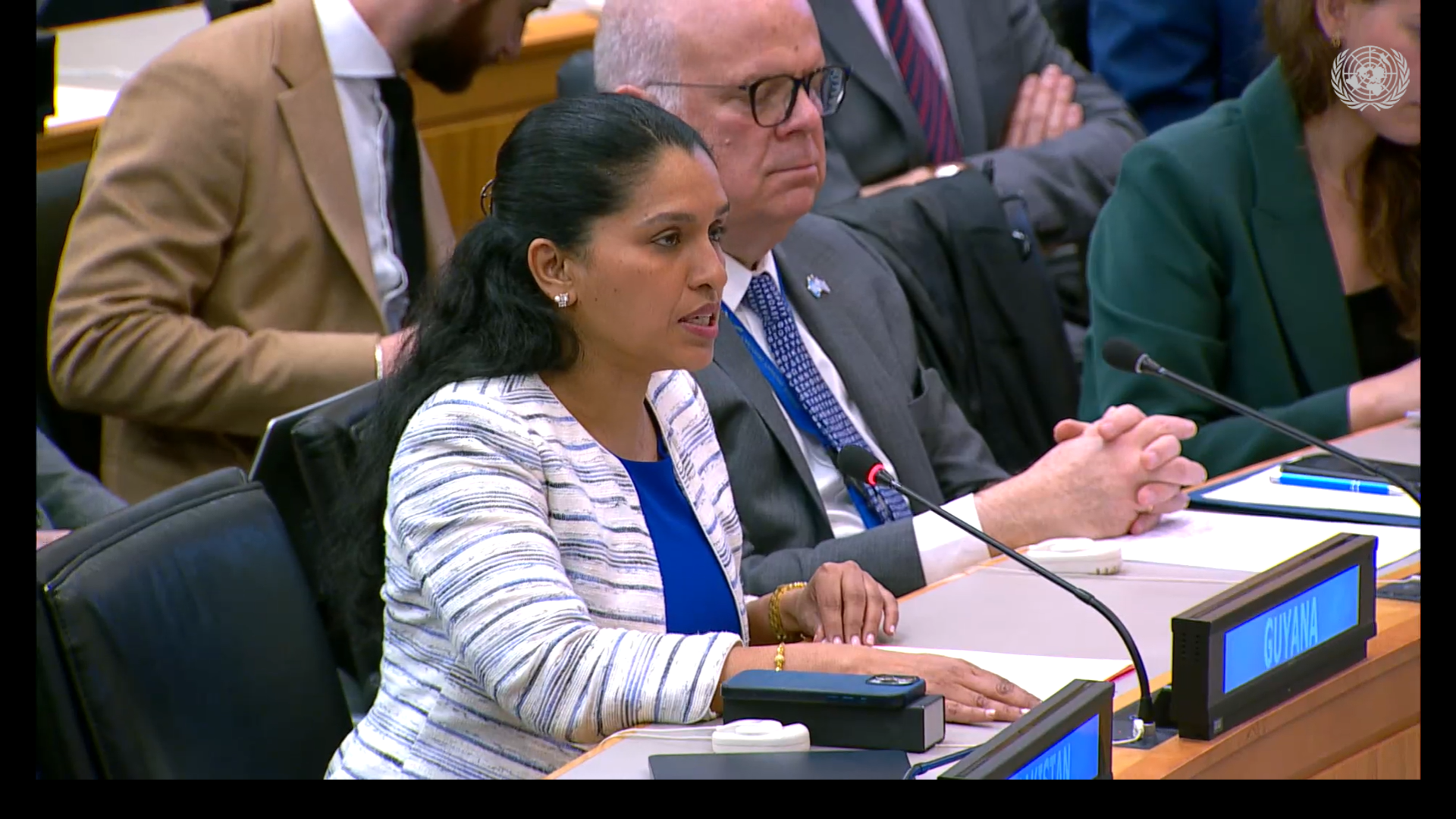Statement delivered by Ambassador Trishala Persaud, Chargé d'affaires, Permanent Mission of Guyana to the United Nations, at Security Council Arria- Formula meeting on Small Arms Control and Weapons Management in UN Sanctions Regimes
Thank you, Chair, and I thank Sierra Leone for organizing this Arria-Formula Meeting, which Guyana is pleased to co-sponsor along with the other members of the A3+.
We welcome the opportunity to contribute to this critical discussion on strengthening the arms control measures within UN-sanctions regimes and thank the briefers Mr. Ebo, Ms. de Tessieres, Dr. Chambas and Mr. Joseph for their insightful contributions.
The proliferation of Small Arms and Light Weapons continues to pose a serious threat to regional and international peace and security, perpetuating conflicts and undermining peacebuilding efforts.
Guyana emphasizes the importance of robust, well-enforced arms control mechanisms as essential tools in addressing the destabilizing impacts of illicit small arms and light weapons. The uncontrolled flow of these weapons and their ammunition not only exacerbates conflicts but also contributes to human rights violations and impedes development, especially in regions experiencing protracted violence.
In our region, the illicit proliferation and trafficking of small arms and light weapons and their ammunition fuel violence, undermine security, and hinder sustainable development, at devastating costs to millions of people. In Haiti, the UN Security Council imposed a territorial arms embargo three years ago to curb the flow of weapons to criminal gangs, who now control over 80% of the capital city and are fueling violence, instability, and human rights abuses. While significant efforts have been made to implement the sanctions measures, weapons and ammunition continue to flow into Haiti and into the hands of gangs, with traffickers shifting routes to escape interdiction.
Chair, colleagues,
Guyana acknowledges the considerable challenges facing the enforcement of UN arms embargos in this and other contexts. These include weak compliance, porous borders, inefficient border and maritime control systems, lack of capacity to register, control, and trace firearms and ammunition, and the broadening of illicit trafficking networks that have enabled the systemic violation of arms embargoes, undermining the efficacy of Council efforts.
We underscore that compliance is the key to achieving the desired outcomes, as the effectiveness of any measure is directly tied to its successful implementation by Member States and the level of compliance achieved. We remind that States have a legal obligation to comply strictly with arms embargoes imposed by the Security Council and urge all states to enhance support for the work of the Panels of Experts tasked with monitoring and enforcing sanctions regimes. This includes supplying timely and accurate information and responding to requests; ensuring that they are adequately resourced; and refraining from any action that would hinder their effectiveness and independence.
We also support practical initiatives aimed at enhancing monitoring and cross-border collaborations and believe that the use of smart technologies to strengthen border control management systems and facilitate data sharing between and among states, will contribute significantly to curbing illicit weapons flows as well as drug and human trafficking and enhance the reliability and efficiency of border control systems.
We urge Member States to subscribe and adhere fully to the UN Programme of Action to prevent, combat and eradicate the illicit trade in small arms and light weapons, the Arms Trade Treaty, and the International Tracing Instrument, which would support a more holistic approach to addressing the illicit trade and misuse of small arms and light weapons.
We also emphasize the importance of integrating effective arms control measures within broader Disarmament, Demobilization, and Reintegration programmes for conflict-affected states. By ensuring the safe collection and disposal of surrendered weapons and supporting the reintegration of ex-combatants into communities, DDR initiatives create sustainable pathways to peace. Guyana underscores the need for harmonized approaches across sanctions regimes in this regard.
Chair,
The importance of partnerships cannot be overemphasized. Regional and sub-regional organizations have a critical role to play in combating the proliferation of small arms and light weapons. We commend the AU’s “Silencing the Guns” initiative, the CARICOM Firearms Roadmap, the Central American Roadmap to prevent illegal firearms trafficking, and other models of regionally driven arms control efforts and call for greater cooperation and synergy between the UN and regional initiatives and instruments, and for affected Member States to share best practices and build capacity.
In conclusion, Chair, Guyana reaffirms its commitment to international cooperation in addressing the challenges posed by small arms proliferation. We urge the Council and Member States to adopt stronger enforcement mechanisms, promote synergies between sanctions regimes and arms control frameworks, and advance sustainable peace efforts.
The responsibility for effective arms control is shared by both exporting and importing states. We urge arms-producing or exporting countries that are not signatories to the Arms Trade Treaty to accede to the Treaty and ensure that arms procurement and transfers within their jurisdiction are vetted in accordance with global norms; that they have an adequate system of national laws and regulations to exercise effective control over the export of arms; to refrain from transferring weapons where there is a clear risk that this would contribute to IHL violations; and to take positive steps to ensure respect for IHL by all parties to an armed conflict.
Through collective action, we can reduce the flow of illicit weapons, protect human rights, and pave the way for a more secure and prosperous world.
Thank you Chair.


